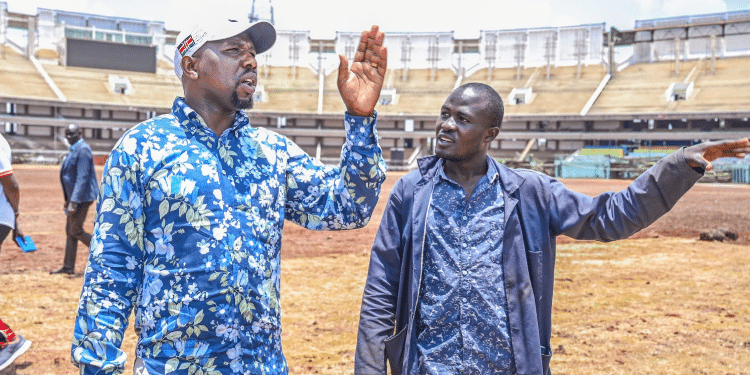A few weeks ago, Kenya’s sports Cabinet Secretary Kipchumba Murkomen proposed leasing out our stadiums to make them more productive.
This proposal reflects the ongoing challenges we face in the sports arena, not just in Kenya but across Africa.
While sports like football, athletics, and rugby are deeply woven into the cultural fabric of our communities, drawing massive followings, the reality is that we continue to struggle with underfunding, poor infrastructure, and mismanagement.
These issues have hindered the growth of sports on the continent, often leaving our athletes underprepared for global competition, despite the immense talent and passion we have.

To tackle these challenges, two strategic options stand out: leasing sports facilities to private entities or implementing Public-Private Partnerships (PPPs).
The State of Sports
Kenya, like many African nations, boasts exceptional athletic talent, consistently producing world-class athletes, particularly in athletics.
However, the development of sports infrastructure in the country lags significantly behind global standards.
Many sports academies, stadiums, and training facilities remain underfunded and poorly maintained, limiting their ability to nurture talent or host major international events.
Also Read: Murkomen to Pay Air Tickets for Two Harambee Starlets Left in Nairobi
Governance issues also plague Kenyan sports. Corruption, mismanagement of funds, and lack of transparency have hindered the growth of sports organizations.
As a result, many Kenyan athletes train in substandard conditions and lack the proper support systems needed to reach their full potential.
This has not only affected the athletes but also the overall development of sports in Kenya, preventing the country from fully leveraging its rich pool of talent on the global stage.
The potential of leasing in sports development
Leasing sports facilities to private investors could be one way to alleviate the current challenges facing sports in Africa.
When governments lease sports arenas or training centers to private companies, they effectively allow these businesses to manage, upgrade, and maintain the facilities for an agreed-upon period. This can lead to several advantages:
- Increased Efficiency: Private entities are often more streamlined in their operations compared to government-run facilities. Leasing out sports venues could lead to better management practices, optimized use of space, and overall improved facilities.
- Upgraded Infrastructure: Private investors can pour capital into upgrading stadiums, training grounds, and other essential infrastructure. This could improve not only the quality of sports training but also attract more regional or international competitions, which in turn boosts local economies.
- Revenue Generation: Leasing arrangements often include revenue-sharing models where the government and private investors both benefit. Revenue can come from ticket sales, branding, advertising, and event hosting. This additional income can be channeled back into sports programs and youth development.

The potential of Public-Private Partnerships (PPPs) in sports development
Public-Private Partnerships (PPPs) offer a balanced approach to addressing Africa’s sports challenges by combining government oversight with private sector efficiency.
In this model, governments and private businesses collaborate to build, manage, and operate sports facilities or initiatives.
PPPs are widely used across sectors like healthcare and infrastructure and could be adapted to sports development.
Benefits of PPPs for Sports in Africa
- Shared Risks and Costs: PPPs allow for the sharing of both financial risks and operational responsibilities. Governments, which may have limited budgets, can benefit from private sector investment, while businesses can profit from sports-related ventures like event hosting, branding, or merchandising.
- Improved Facilities: Like in leasing, PPPs can lead to better maintained and modernized sports facilities. But unlike leasing, the government retains a significant level of control, ensuring the public interest is safeguarded. Upgraded stadiums or training centers could attract more sponsorships, larger crowds, and more media attention.
- Community Development: By retaining more government involvement in the partnership, PPPs ensure that sports development is aligned with broader community goals, including youth programs, talent identification, and inclusivity. This makes PPPs a more socially responsible option, ensuring that sports remain accessible to all.
- Long-term Sustainability: PPPs typically involve long-term contracts, which promote consistent investment and growth. Private investors in a PPP are more likely to see the value in long-term sports development, nurturing talent and infrastructure in a way that provides ongoing benefits.
Which Model is Better for Africa?
Literature generally favors PPPs for sports development, especially in countries looking to balance investment, talent development, and community engagement.
Research shows that PPPs offer a more structured approach to delivering public services efficiently while ensuring the public’s interest is preserved.
In contrast, leasing is seen as more beneficial for managing existing facilities rather than fostering long-term sports development.
However, in cases where governance issues, corruption, or mismanagement may pose risks, leasing could be a more immediate solution.
Also Read: FKF Names New CEO After Barry Otieno Resigns
Leasing allows private companies to manage and maintain sports facilities without heavy government involvement, potentially reducing bureaucratic inefficiencies.
That said, leasing carries the risk of sidelining public interests and inclusivity if not properly regulated.
Ultimately, both models have their advantages in Kenya, but success will depend on transparent agreements, strong community engagement, and a clear focus on improving sports infrastructure and athlete development.
With the right strategies, either option could help Kenya unlock its sports potential and bridge the gap between talent and resources.
Follow our WhatsApp Channel for real-time news updates!
https://whatsapp.com/channel/0029VaB3k54HltYFiQ1f2i2C










































































